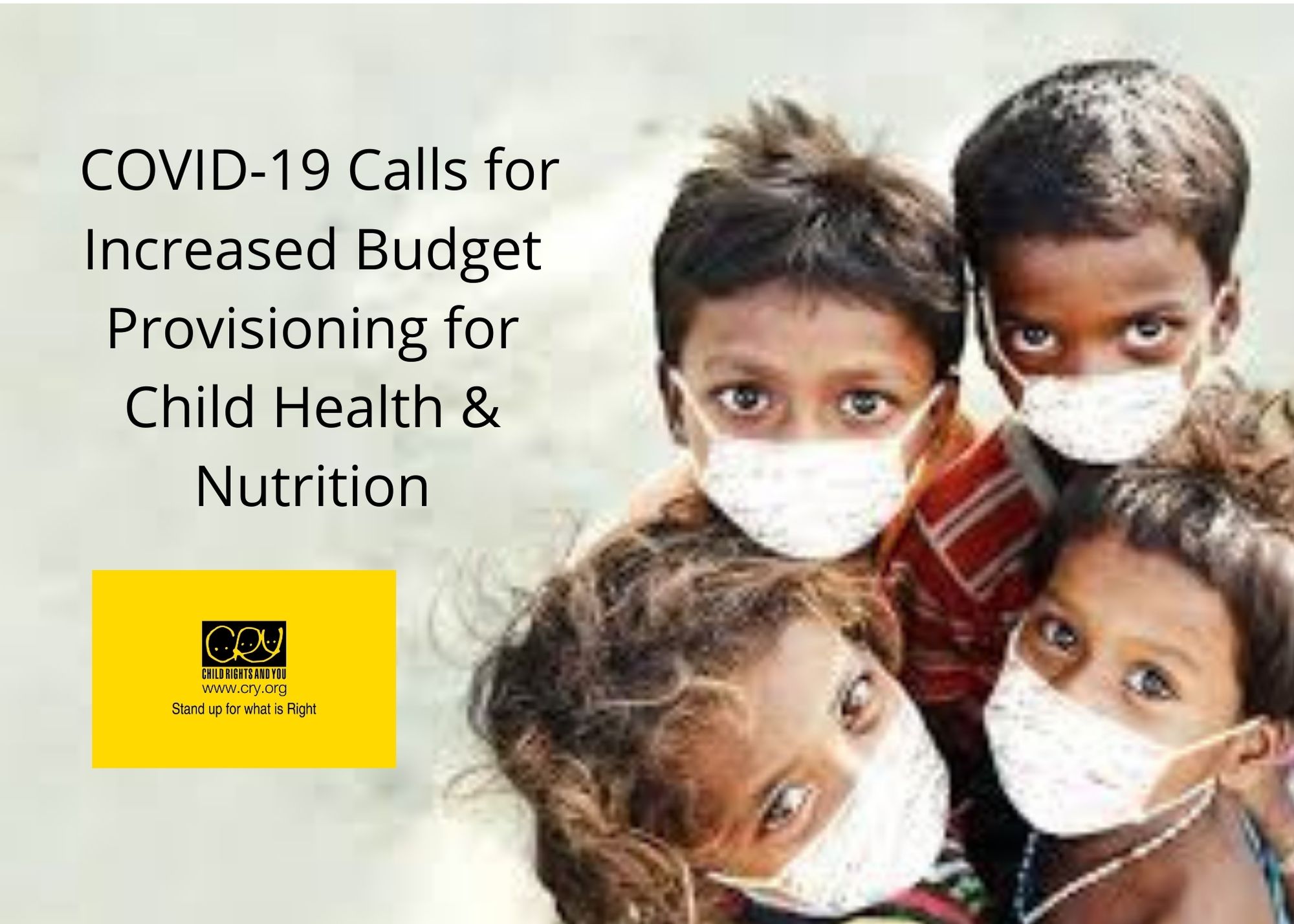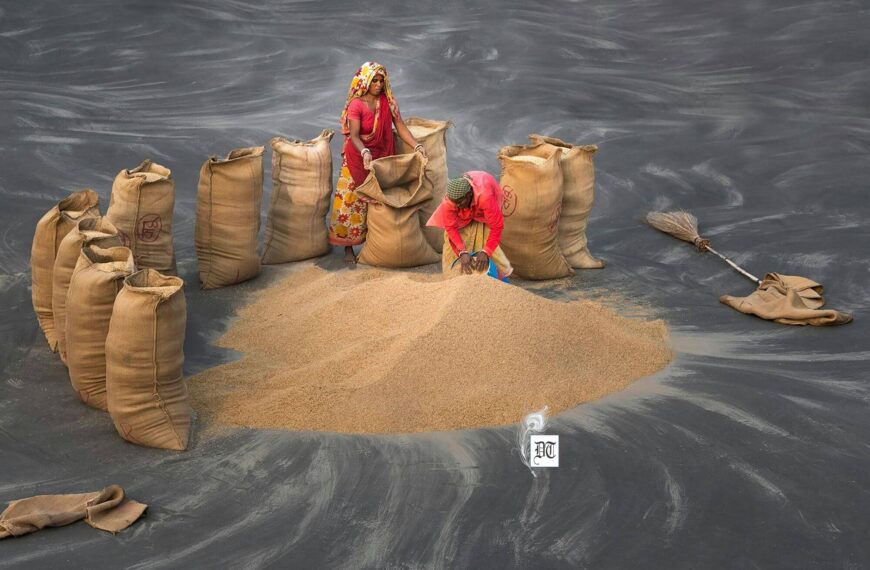A national webinar organised by Child Rights and You (CRY) and Centre for Budget and Governance Accountability (CBGA) throw light on the critical issues and practical challenges with the nutrition and health of children, during and beyond the COVID-19 pandemic. A report in Different Truths.
New Delhi: Over the last few years India has seen some improvements when it comes to child health and nutrition. There is no denying that during the pandemic the government, civil society organisations and various private entities have made lots of efforts to combat malnutrition thus consolidating the gains that India had achieved, stated a media release.
… while India enjoys the status of a food-surplus country, 1 in every 3 children in India are still malnourished and only 9.6 per cent of our children between 6-23 months in the country receive an adequate diet.
However, there is also no denying the fact that while India enjoys the status of a food-surplus country, 1 in every 3 children in India are still malnourished (CNNS, 2016-18) and only 9.6 per cent of our children between 6-23 months in the country receive an adequate diet (NFHS-4, 2015-16).
While these data pertain to the period before the COVID-19 pandemic, the situation is likely to aggravate now, as the pandemic raises critical pointers to immunity, availability of quality food and nutrition. At present, it might seem difficult to fully assess the impact of pandemic on the long-term health of our children. However, the potential ripple effect created by COVID-19 is likely to adversely impact different facets of the quality of life, including the nutritional status of vulnerable children.

COVID-19 crisis has highlighted some of the pre-existing gaps as far as child nutrition is concerned…
COVID-19 crisis has highlighted some of the pre-existing gaps as far as child nutrition is concerned which may need better public provisioning in the coming days, specially to cater the nutrition and health needs of the vulnerable children and communities. India already has several Government programmes such as the Targeted Public Distribution System (TPDS), the Mid-Day meals (MDM), the Integrated Child Development Services (ICDS), and Poshan Abhiyan in place to address food insecurity and malnutrition, however, these interventions have been disrupted since March 2020 due to the lockdown, the release added.
Even though the government extended several support mechanisms to combat food and nutrition insecurity in the trying times, there is great risk with the overburdened health systems. There might be a lack of attention to other health and nutrition-related interventions, which includes immunisation, antenatal care, and micronutrient supplementation, among others.
A quick glance at the Union Budget over the last three years shows that allocations towards Anganwadi Services increased from Rs. 15245.19 crores (2017-18 BE) to Rs. 19916.41 crores (2020-21 BE).
The past few years have seen significant efforts directed towards improvement in child nutrition and development. A quick glance at the Union Budget over the last three years shows that allocations towards Anganwadi Services increased from Rs. 15245.19 crores (2017-18 BE) to Rs. 19916.41 crores (2020-21 BE). Similarly, allocations for National Nutrition Mission have increased from Rs. 1500 crores (2017-18BE) to Rs. 3700 crores (2020-21 BE). Allocations towards NHRM-RCH flexible pool also saw a gradual increase from Rs. 2454.42 crores (2017-18 BE) to Rs. 2982 crores (2020-21 BE).

To discuss the critical issues and practical challenges related to spheres of child nutrition and health of children and pregnant and lactating women, during and beyond the COVID-19 pandemic, Child Rights and You (CRY) and Centre for Budget and Governance Accountability (CBGA) held a national webinar that brought together academicians, subject experts, and NGOs working on themes of child nutrition and child health.
Puja Marwaha, CEO, CRY elaborated on the challenges of ensuring health and nutrition security for children and adolescent girls…
Puja Marwaha, CEO, CRY elaborated on the challenges of ensuring health and nutrition security for children and adolescent girls, based on the on-ground experiences from CRY’s intervention areas across 19 states in the country, the media release informed.
Puja said, “CRY efforts focus on providing nutritional security to vulnerable families by providing seeds and manure to develop household level kitchen gardens. These efforts paid off especially during the pandemic, as they have helped make vegetables more affordable, improved dietary quality and is a sustainable source of nutrition. While interventions at the micro-level are critical, we feel that unless challenges related to adequacy in budgetary allocations, and bottlenecks in utilisation are addressed, we will be unable to mitigate the loss caused due to pandemics such as COVID-19. Unless systemic resilience is built and strong mechanisms for public provisioning are ensured, the cumulative effect of community-level interventions would not be visible.
“With COVID-19 pandemic having impacted nutrition delivery services and nutritional status of pregnant women, children below 6 years and adolescent girls significantly, we are hopeful that allocations towards child development and nutrition will see an exponential increase in the coming years,” Puja added.
… Shruti Ambast, Senior Policy Analyst of CBGA said, “CBGA’s District-level budget analysis of 5 districts and 4 states) shows high fund utilisation in important centrally sponsored schemes like SSA.
Highlighting various facets of Public Financing for Child Nutrition, Shruti Ambast, Senior Policy Analyst of CBGA said, “CBGA’s District-level budget analysis of 5 districts and 4 states) shows high fund utilisation in important centrally sponsored schemes like SSA. ICDS MGNREGS, etc. in 2017-2018 and 2018-2019. But fund utilisation was relatively lower for MDM and NHM, indicating that resource absorption capacity is good in certain schemes and some districts/states perform better than others. Sustaining demand for higher allocations therefore becomes crucial.”
Highlighting the vulnerability of adolescents, Mini Varghese, Country Director, Nutrition International said, “Out of school adolescents is a group which is vulnerable to under-nutrition amid the pandemic. And it is not just girls, out of school adolescent boys are equally vulnerable and there is no mechanism to reach boys. Evidence suggests that in low-income countries, supplementation, dietary diversity and food fortification are possible solutions to address nutrition challenges.”
Avani Kapur, Director, Accountability Initiative said, “Fund release, approval, reporting, and allocation need to be streamlined for better public financial management (PFM)…
Talking about the reforms needed to address bottlenecks in public financing,Avani Kapur, Director, Accountability Initiative said, “Fund release, approval, reporting, and allocation need to be streamlined for better public financial management (PFM). We can start small, but I feel that in schemes like nutrition, decentralization is always key.”

Kapur especially highlighted the critical role played by the women frontline workers like Anganwadi workers, ASHAs and ANMs and lauded their role in reaching out to the households during the pandemic. One is hopeful that adequate budgets will be allocated to address their challenges related to safety and working conditions.
Stressing on the need to invest in improving nutrition, Shweta Khandelwal, Head of Nutrition Research, Public Health Foundation of India said, “Women in India face multiple challenges including poor food, health and care environments along with early marriage, early conception, multiple pregnancies and social status. Hence it is critical to ensure pre-pregnancy well-being for good maternal and child outcomes. Only giving ration to pregnant women, mothers won’t help. We also need to strengthen the social safety nets for women and relook at nutrition component.”
Dipa Sinha, Assistant Professor, Ambedkar University, Delhi spoke about food insecurity and shedding light on different determinants to address the issue.
Dipa Sinha, Assistant Professor, Ambedkar University, Delhi spoke about food insecurity and shedding light on different determinants to address the issue. She said, “Most people in our country cannot afford a healthy diet. We have not attained the level where we can access wholesome food. On ground research highlights that hunger is increasing post COVID. Whatever nutritious food people were consuming before COVID, has been decreasing. We need to understand that malnutrition has different determinants and solving one is not going to address the whole issue, but it is vital to do all.”
The media release added, to read the full policy document developed and issued by CRY on the impact of COVID-19 on child nutrition in India and the budgetary implications, click on this link: https://testsitestaging.cry.org/downloads/health-and-nutrition/impact-of-covid-19-on-child-nutrition-in-india-what-are-the-budgetary-implications-policy-brief.pdf
Visuals sourced from CRY and by Different Truths





 By
By


 By
By